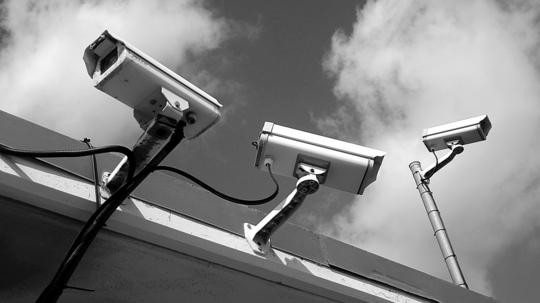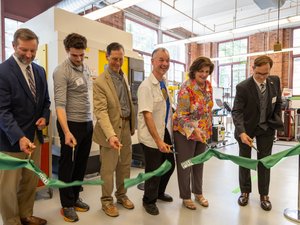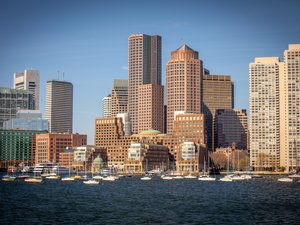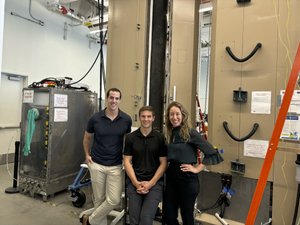
This week, Boston will take one step closer to banning the use of facial recognition software by municipal authorities.
A proposed ordinance, filed May 6 by City Councilors Michelle Wu and Ricardo Arroyo, would prevent city officials from using any face surveillance system or information from such a system. It would also prevent the city from entering into agreements with third parties to use those systems.
The council is slated to hear arguments virtually on Tuesday afternoon, including testimony from the public.
The ordinance would make Boston the sixth city in the Commonwealth to enact such a ban. Cambridge, Somerville, Brookline, Northampton and Springfield have all passed similar ordinances.
“It’s important for the City of Boston to start taking steps that cities in the surrounding area have done to ban facial recognition technology,” Wu told BostInno in an interview in March. “We know that it is discriminatory. We know that the potential for widespread usage is something that needs careful discussion and analysis. So, until there is clear proof that civil liberties and racial profiling are no longer issues, Boston should follow the lead of our neighboring municipalities.”
Wu is referring to facial recognition technology’s notorious unreliability, which typically falls along racial lines: A federal study in December found that Asian and African American people were up to 100 times more likely to be misidentified than white men, and Native Americans had the highest false-positive rate of all ethnicities.
Despite this, police departments have been using facial recognition software for nearly two decades, historically relying on records like driver’s license photos and mugshots. Civil rights advocates have repeatedly raised concerns that facial recognition technology, rather than being a savvy technical solution that limits the potential for human error, could instead reinforce existing biases, leading to even higher arrest rates for Americans of color.
“The time to move forward was a while ago,” Wu said. “We’re playing catch-up at this point.”
In the Boston ordinance, Wu and Arroyo write that governments have responded to the coronavirus pandemic with an “unprecedented use of surveillance tools, including face surveillance technology.” China, for example—which is already known for surveilling its citizens—recently began using software to analyze Wuhan residents' personal data to sort individuals into color-coded categories based on their level of risk for Covid-19.
The pandemic certainly creates a flashpoint, but it has long been a concern of civil rights advocates that facial surveillance tools are making a slow march toward ubiquity—while the technology is still riddled with inaccuracies.
“A lot of surveillance technology tends to be, ‘Well, wouldn’t you accept that this evil is keeping the bad guys away?’” said Lindsey Barrett, a staff attorney and teaching fellow at the Institute for Public Representation Communications and Technology Clinic at Georgetown Law. “The fact is, we have so little evidence of it ever doing that, and so much evidence that it doesn’t, in addition to all the evidence of the collateral harm that it brings.”
The Boston ordinance is part of the ACLU of Massachusetts’ “Press Pause on Face Surveillance” campaign. Launched last June, the initiative has three goals: to educate the public and lawmakers about what the group describes as the “danger” facial recognition poises to civil rights, to pass municipal prohibitions on the government’s use of the technology and to pass a statewide moratorium on the same.
Spurred by the ACLU, the proposed statewide moratorium has already found its way to Beacon Hill. The Senate version of the bill would place a moratorium on facial recognition technology as well as other forms of biometric surveillance, including the analysis of a person’s gait and eyes.
The bill, however, has been lingering in the public safety and homeland security committee since last January; its counterpart in the House has been in the judiciary committee for the same amount of time.
This stall is despite widespread support. A poll conducted by the polling group Beacon Research and published by the ACLU of Massachusetts last year found that 91 percent of Massachusetts voters believed the state needs to regulate the government’s use of face surveillance technology.
In October last year, dozens of people, including officials from the office of Suffolk District Attorney Rachael Rollins, the Boston Teachers Union and MIT, testified in support of the moratorium at a legislative hearing. Among the speakers was Brennan White, CEO of Boston-based Cortex, which creates AI platforms for social media marketing and uses facial recognition technology regularly.
Unbridled use of the technology could potentially set “up an infrastructure that could be abused by future dictators,” Brennan said in the hearing, as reported by MassLive. “In the wrong hands, this could lead to a dystopian-type society.”
Brennan’s fears are shared by the bill’s creators at the ACLU of Massachusetts. For Kade Crockford, director of the organization’s Technology for Liberty program, failing to pass a moratorium now could enable government agencies to set up a technology infrastructure like that in China, which tracks individuals’ movements virtually everywhere.
“That kind of surveillance has no place in a free society, and we think it actually ought to be permanently banned in Massachusetts,” Crockford said.
Still, bans can only go so far. Cambridge’s ban, for example, does nothing to prevent corporations or institutions like Cambridge-based Harvard University and MIT from conducting research on facial recognition, or even monitoring people coming to their buildings.
Experts like Barrett believe that a blanket ban at the federal level will be required to be effective, although there are ways to make local ordinances against facial recognition tech stronger in the meantime. Cities including Seattle and Oakland have created citizen oversight boards to advise on facial recognition policy.
In Boston, a municipal ban of facial recognition—if it passes—could be just a first step in limiting the use of surveillance tech in the city.
“On a related and parallel track, we have been thinking about how to regulate surveillance technology in general,” Wu said. “This is talked about most frequently in the law enforcement context. But there are so many ways in which cities and governments are gathering information on people that we have to have a very comprehensive framework for overseeing surveillance technology across the board.”








